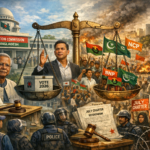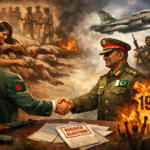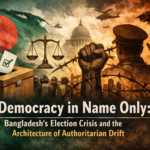In recent months, the political landscape of South Asia has been rocked by an unexpected and seemingly improbable shift: a sudden thawing of relations between Pakistan and Bangladesh. The two countries, once bitter enemies after the brutal 1971 war of independence, are now engaged in talks that suggest a desire to mend long-broken ties. This rapprochement has raised eyebrows across the globe, especially in Bangladesh, where the scars of 1971 are still very much alive in the collective consciousness of the nation.
But beneath the surface of diplomatic gestures, public apologies, and the promise of financial reparations, the question remains: can Bangladesh afford to trust Pakistan? Is this new alliance just another Trojan horse, one designed to infiltrate the heart of Bangladesh’s sovereignty once again? And, more importantly, is Pakistan truly capable of delivering on its promises of reparation, considering its own crumbling economy and long history of terrorism exportation?
The Historical Context: 1971 and Its Lingering Legacy
To understand the gravity of the situation, one must first revisit the traumatic history that still hangs over Pakistan-Bangladesh relations. In 1971, the Pakistani military committed horrific atrocities during the war for Bangladesh’s independence. The bloodshed, marked by widespread rapes, mass killings, and arson, left a scar so deep that it remains a sensitive subject to this day. Estimates suggest that hundreds of thousands, possibly millions, of people lost their lives. The violence was not only physical but psychological, as entire families were wiped out, entire villages torched, and cultural heritage lost forever.
The horrors of that time are not forgotten, and Bangladesh, as a sovereign state, has long demanded recognition and justice for the crimes committed against its people. Since independence, the country has continuously called for an official apology from Pakistan and the payment of reparations as a form of reconciliation. But these calls have often been met with denial or indifference, especially from Pakistan’s military establishment, which continues to downplay its role in the atrocities.
Now, however, Pakistan appears to have changed its tune. Public statements and diplomatic overtures suggest a willingness to at least entertain the idea of offering reparations—financial compensation for the destruction caused. But is this truly a sign of genuine remorse, or is it a carefully crafted political move?
The Deep State and the Terrorism Exportation Question
Pakistan’s deep state—the powerful military intelligence apparatus that operates with near impunity—has long been accused of supporting terrorism abroad. From the Kashmir insurgency to the Taliban in Afghanistan, the Pakistani military’s role in fostering extremist groups is well-documented. The idea that a nation with such a history of exporting terrorism could suddenly change its ways and genuinely seek peace with Bangladesh seems, at best, naive.
Pakistan’s intelligence services, such as the ISI (Inter-Services Intelligence), have long been suspected of maintaining links with terrorist organizations that target both regional and global security. The very same institutions that perpetuated violence during the 1971 war are, in many ways, still in control. Therefore, any diplomatic gestures aimed at reconciling with Bangladesh must be viewed with extreme caution.
A sudden overture of peace, backed by promises of reparations, could very well be an attempt to weaken Bangladesh’s resolve and gain leverage in the region. With its own economy teetering on the edge of collapse, Pakistan may see the need to “reassert” itself regionally. Bangladesh, which has made remarkable strides in economic development, could be seen as a strategic partner—or even a target.
The Financial Viability of Reparations: Can Pakistan Afford $4-$5 Billion?
One of the more pressing questions in this unfolding drama is whether Pakistan, which has struggled to maintain economic stability, can even afford to pay the reparations it has promised. The Pakistani economy is in disarray, grappling with inflation, mounting foreign debt, and an ever-declining rupee. The country has relied heavily on international aid and loans, primarily from China and the International Monetary Fund (IMF), but the state of its finances raises serious questions about its ability to pay reparations to Bangladesh.
For Pakistan to provide the estimated $4-5 billion in reparations that Bangladesh demands—this amount being a conservative estimate—the country would have to find substantial financial resources, which may not be feasible in the near future. Pakistan’s domestic budget is stretched thin, and with unemployment rates soaring and foreign reserves at dangerously low levels, its capacity to make such a payment seems dubious.
Further complicating matters is the question of accountability. Who would truly benefit from these reparations? Would they go toward rebuilding the lives of those affected by the atrocities of 1971, or would they be swallowed by corruption and mismanagement, as is often the case with foreign aid and compensation in Pakistan?
Is This a Trojan Horse?
Given Pakistan’s track record, it is not unreasonable to question the motives behind its sudden shift in stance. Could this be a Trojan horse in disguise, a long-term strategy to weaken Bangladesh’s resolve and undermine its sovereignty? Pakistan has long coveted regional influence, and Bangladesh, with its rapidly growing economy and strategic location, could be a key player in Pakistan’s future geopolitical strategy.
The idea of an apology and financial reparations is appealing on the surface, but one must ask: why now? And why should Bangladesh trust a country with such a fraught history of duplicity and violence? Is this merely a tactical maneuver, or is Pakistan genuinely seeking a new era of peaceful coexistence with its neighbor?
Furthermore, as Bangladesh continues to modernize and grow, it must be cautious about any political or economic entanglements that could jeopardize its hard-earned independence. The country has built itself from the ashes of war and has shown resilience in the face of adversity. It cannot afford to allow its progress to be derailed by hollow promises from a nation with such a checkered history.
Conclusion: A Cautious Optimism or a Dangerous Bluff?
While it is tempting to view the recent diplomatic overtures as a sign of hope and reconciliation, Bangladesh must remain vigilant. The shadow of 1971 still looms large, and the wounds of that war have not fully healed. An apology and reparations from Pakistan are long overdue, but they should not be accepted blindly. Bangladesh must ensure that these promises are not simply a bluff designed to weaken its position in the region.
Can Pakistan afford to pay the reparations? Unlikely. Can it be trusted to honor its commitments? The history of betrayal suggests otherwise. Bangladesh, as a sovereign and proud nation, must navigate these complex waters with caution. After all, history has taught it that the price of peace can often be far steeper than it appears at first glance.






